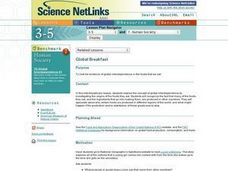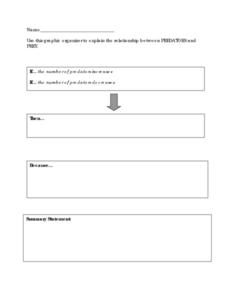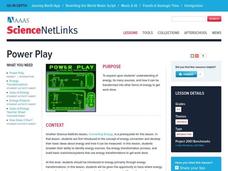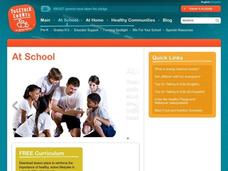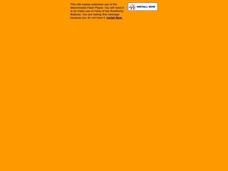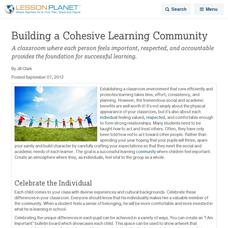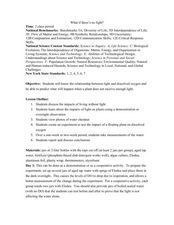Curated OER
Hatching Chicks to Agriculture - Where does the feed come from?
Second graders examine the types of grain that goes into feed for chickens. They study other grain crops grown in Kansas and the foods that are made from them.
Curated OER
Global Breakfast
Students explore different cultures. In this global interdependence lesson, students discuss how food is produced and distributed. Students discuss different cultures and foods they eat. Students search the National Geographic website...
Curated OER
What Would Halloween be Like Without the Ecuadorian Rainforest?
Fourth graders are given a number of typical Halloween treats and work in groups to determine which foods came from the Rainforest (chocolate) and which foods came from temperate regions (apples, popcorn) and treats that don't have...
Read Works
How to Say “I Ruff You”
Who says you need a human to be your valentine on Valentine's Day? Give your dog-loving readers an inspiring perspective on how a sister givdes her brother a valentine from the family dog. They then answer 10 questions thatd involve...
Curated OER
Theobroma - Food of the Gods
Students discuss the history of cacao and its use in the production of chocolate. They analyze actual cacao pods and record their observations. Finally they create a five minute contour drawing of the cacao pod and seeds.
Curated OER
From McGee's Farm to the Movies
Students participate in several plant-themed activities. They keep a food log, identify any plants they have eaten and then classify these foods by the part of the plant that is edible. Students sing songs about plants, make collages,...
Curated OER
Sources of Energy
Fifth graders take a close look at how energy changes from one form to another within their surroundings. They also study the ten different sources of energy and determine which are renewable and which are non-renewable. This seven-page...
Curated OER
Predators and Prey
Students explain how the food chain works. They contrast predators with prey and describe their function in nature. Students discuss how the food chain aids in keeping nature balanced. In small groups, they play a game that simulates the...
Curated OER
The Seed Match
Students examine seeds and predict the plant it comes from. In this seed match lesson, students match seeds to plants and then see if their predictions are correct. Students predict the number of seeds found in plants as well. Students...
Curated OER
Get Involved: Hunger Action Month
Chances are that food insecurity touches the lives of your students so dive in to understand the problem and look for ways to help
Curated OER
Early Childhood Nutrition
Students complete activities that focus on food and nutrition. In this food lesson plan, students sort foods into healthy and not healthy, categorize them into ground and tree sorts, draw their favorite foods, make abc books of food, and...
Curated OER
Power Play
Once your physical science stars have a grasp of the different forms of energy, use this resource to get them putting the energy to work. Small groups choose from seven different project options and work together to build an energy...
Curated OER
Physical Activity and Energy
Does smiling take as much energy as running a lap around the track? Everything the body does requires energy. The more vigorous the activity, the more energy the body requires to perform the activity. Compare different low-energy...
Curated OER
Full Esteem Ahead
Does having higher self esteem encourage learners to take better care of themselves? It absolutely does! Does having high self esteem mean that one likes everything about themselves? No, but that they like most things and can work to...
Curated OER
Making Active, Healthy Lifestyle Choices
What does the term "lifestyle" mean? What constitutes an active lifestyle? What constitutes a healthy lifestyle? The main ideas in this lesson focus on what an active healthy lifestyle looks like. There are questions for discussion, and...
Curated OER
The History of Rice
Fourth graders investigate the history of rice by drawing a timeline of important dates. In this food history lesson, 4th graders research the history of rice, where it came from, and who first used it for food. Students...
Curated OER
Building a Cohesive Learning Community
A classroom where each person feels important, respected, and accountable provides the foundation for successful learning.
It's About Time
Energy Flow in Ecosystems
Emerging biochemists more fully understand the flow of energy in ecosystems as they explore the laws of thermodynamics and relate them to energy transfer in food chains. They also investigate heat loss from the human body and how...
Science Matters
Basic Needs
Scholars take part in a grand conversation about the basic needs of living things. Working collaboratively, pupils brainstorm and identify similarities to come to the conclusion that the environment meets the needs of all living...
Curated OER
What If There's No Light?
students discuss the importance of light and the consequences of living without it. Using a plant as a demonstration, students predict and observe what happens to a plant when it does not receive enough light. In groups, they experiment...
Curated OER
Let’s Make Cottage Cheese
Students watch the process of making cottage cheese from milk, then season and taste the product. In this making cottage cheese lesson plan, students make a connection between what they eat and where it came from. Students...
Curated OER
Fats
In this fats worksheet, students review what fats are made up of, where fats come from, and how our body uses fats. Then students access a website to compare good fats and bad fats. This worksheet has 1 graphic organizer, 13 short answer...
Curated OER
"From farm to plate"
Students identify sources of food and the bacteria associated with them. They comprehend how bacteria in the food chain can cause disease. Students comprehend the importance of proper food-hygiene practices throughout the many stages of...
California Academy of Science
Composting: A Scientific Investigation: California Academy of Sciences
Garbage, recycle, compost: Does it really matter where we put our trash once we are done? By making detailed observations over seven weeks, kids will see which materials break down naturally to become a healthy part of the soil, and...



